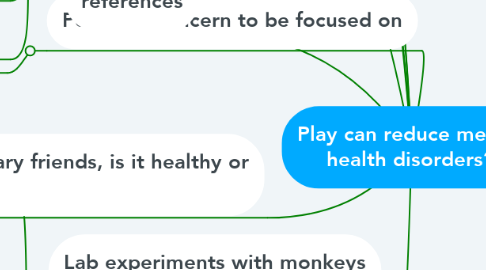Play can reduce mental health disorders?
by Jessica Chivers


1. Points of concern to be focused on
1.1. special focus on grammar and referencing as this has shown to be significant weaknesses in my previous work.
2. The long term effects of popularity in school
2.1. Dodge Et Al link in
2.1.1. those who felt there were rejected at school were more likely to achieve less accademically, have less social skills, a lessened theory of mind and weak reasoning and problem solving skills.
3. Introduction
3.1. What is play?
3.2. Why is it important (a brief touch)
4. Lab experiments with monkeys and mice how shown that socially isolated animals (those who are unable to interact in social play) when they developed were socially and emotionally crippled.
4.1. This could be started by linking in ho animals depend on play quite obviously, in risky play they learn physical skills which push their boundaries so they know where their limit is, such skills could one day save their lives.
4.2. The animals when faced with a fearful enviroment they either froze or acted out in over the top innofective aggression.
4.2.1. this supports that alike a child, if the animal is socially iscolated from play they will develop kess emotional and social skills that are crucial to life.
4.2.1.1. Example of orphan's in Romania that did not experience compassion or social interaction. These orphanes were shown to not develop important social skills which affected them throughout their life.
4.3. However it can be said that one form of play is of course, solitary which involves the child playing by themselves (birth-2 years (Parten et al)). so the above is not to say isolated play is not beneficial, just that without parallel, associative and co-operative play which occurs 2 1/2 years to 5 1/2 years development is not as good. (related back into the effect of popularity, e.g. those that are rejected tend to develop less effective social skills which can affect their whole life of social interaction.
5. In the 50's school holidays were 2 weeks longer than they are now. Outdoor play is such more incorporated into daily life meaning children have more freedom to explore and develop.
5.1. The importance of rough and tumble play: play fighting which usually occurs in boys aged 7-9 years old. Rough and tumble play has been suggested to develop and understand cause and effect- which could help them later on in life appropriately dealing with different social encounters.
5.2. However (panksepp and scott (2012) structured play now more dominant e.g. playing outside now is more dangerous than it has ever been with an increase of the amount of cars on the road and with the rise in technology use in young people social interaction is less common, eg. there wouldnt be any children outside to play with anyway.
5.3. It can also be said that although technology does not inolve rough and tumble play social interaction is sitll relavent. As games now make it easy to socialise with peers when at home.
5.3.1. Cyberbulling affect - constant.
